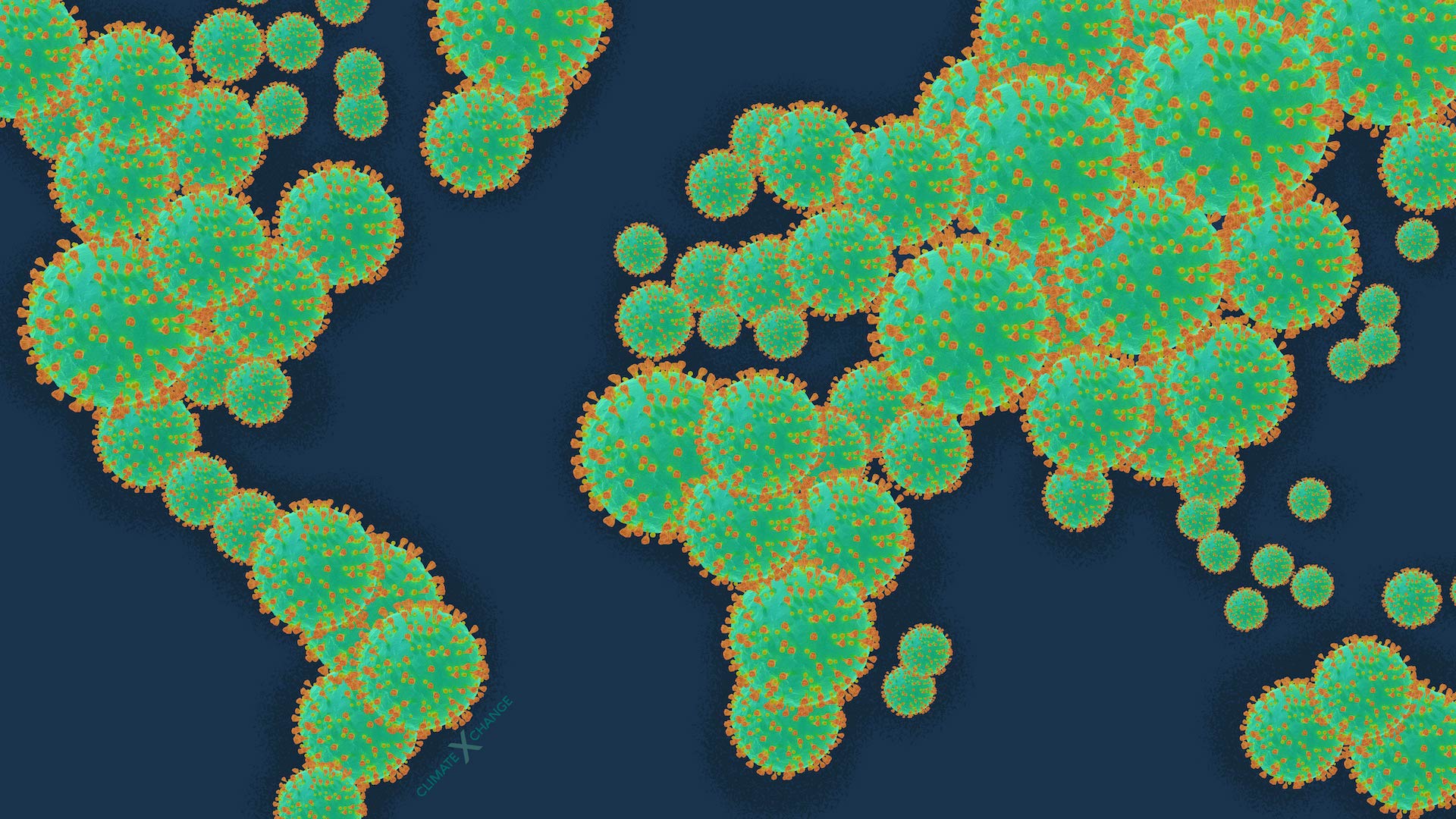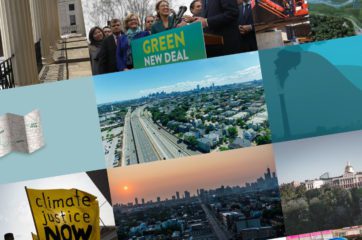In a matter of weeks, the world — and our lives — have transformed in response to a public health crisis.
Throughout China, Italy, Japan, and South Korea, workers have been on lockdown for weeks. Now, companies across the U.S. are joining countries from around the globe in urging employees to stay at home in order to prevent continued community spread of the coronavirus, or COVID-19. Large public gatherings are being canceled or advised against in large parts of the world — the NBA, NHL and MLB have postponed their seasons, music and arts festivals have been cancelled, and a sense of collective fear and anxiety are taking hold across continents. The behavioral changes and economic impacts stemming from the coronavirus are so monumental, they are visible from space.
These are stressful times, so be mindful to take care of your physical and mental health as you are able. Staying informed, and keeping a clear head is critically important. Here are some things you can do to stay healthy, and remember to check in on loved ones, and neighbors.
It is critical to keep in mind that behind the headlines, medical studies, and research, there are human beings who are suffering, dying, and in many cases watching in desperation as their loved ones fall ill. Fundamentally, this is a humanitarian crisis, but it is one that has also called into question our ability for collective response, our role as responsible citizens, our sources and channels of information, and above all, our ability to respond to crises promptly and effectively.
There are also, for those of us in the climate space, eerie similarities between the impacts of both the current pandemic and the climate crisis, and some deeply unsettling contrast between our responses to them.
We don’t yet know in full the behavior of the disease and its ramifications, as open questions remain around mortality rates, vulnerability of different age groups, and seasonal patterns of the virus. But for as many questions remain, what we do know so far is the scary prospect of a deadly and far-reaching pandemic — one that global public health officials have been warning us of for decades.
There are also, for those of us in the climate space, eerie similarities between the impacts of both the current pandemic and the climate crisis, and some deeply unsettling contrast between our responses to them.
It has left many of us mainly wondering why the response to the novel virus was so prompt and swift, while we continue to drag our feet on decades of climate inaction? And, what would happen if we indeed responded to the climate crisis with a similar level of urgency and swiftness as we did with COVID-19?
For the better part of a century scientists have also been warning us about the looming effects of increased concentrations of heat-trapping gases in our atmosphere, but maybe we have been able to afford being blind to how those will personally impact each of our lives. A ‘privilege’ we don’t quite have when it comes to an infectious disease. In truth however, these two public health and global crises share a lot in common, and our current response can — and should — inform how we respond to the climate crisis and its related threats.
Shared Impacts: How Crises Reveal Inequities
Frank M. Snowden, author of “Epidemics and Society: From the Black Death to the Present” writes in an interview for the New Yorker, “Epidemic diseases are not random events that afflict societies capriciously and without warning,” he writes. “On the contrary, every society produces its own specific vulnerabilities. To study them is to understand that society’s structure, its standard of living, and its political priorities […] They show the moral relationships that we have toward each other as people, and we’re seeing that today.”
Indeed, much like climate-related disasters, pandemic events also have the ability to show us the very vulnerabilities that we are already living with — or in many cases, perpetuating.
Indeed, much like climate-related disasters, pandemic events also have the ability to show us the very vulnerabilities that we are already living with — or in many cases, perpetuating. By history, design, and political systems, many of us have been left worse off by systems of marginalization and oppression. These become heart wrenchingly evident when we are faced with stressors to those systems. It’s not just that the elderly more at risk of dying from this disease (and from heat waves), but the inequities under which we currently live also make many of us much more vulnerable.
The idea that we can afford to take precaution and work from home in order to mitigate the spread of the disease in our communities, inherently comes from a position of privilege. Hourly wage earners do not have that privilege. And it does not stop there. In the United States in particular, issues around medical insurance and the overwhelming lack of appropriate health coverage for many Americans is also cause for great concern during this time. So is access to childcare when schools are closed, access to food and medicine, and many other realities that are easier to ignore when we don’t face immediate threats to our public health and safety.
There has undoubtedly been a significant level of apathy, ignorance, and selfishness in our collective reaction to this virus; this been hard to watch, especially when considering the levels of suffering and challenges that are coming as climate impacts become more tangible and wide-spread. And yet, for as many terrible things this disease has shown us about ourselves and the social and political structures under which we live, it also has shown incredible levels of will and resilience in how we have chosen to respond in mitigation to the spread of the disease.
Divergent Responses: Lessons from the Pandemic
The response to this pandemic also provides us with an opportunity to see just how much we can truly accomplish collectively with the right combination of political will, civic engagement and responsibility, and attention to science and facts.
We might just find that we can, after all, hold onto each other and engage responsibly to protect those who are more vulnerable than ourselves. This pandemic shares similar impacts to those of the climate crisis — it has virtually and physically altered our systems and ways of life in dare-I-say unprecedented ways and it has just done it in a matter of hours and days, not years and decades.
The response to this pandemic also provides us with an opportunity to see just how much we can truly accomplish collectively with the right combination of political will, civic engagement and responsibility, and attention to science and facts.
This crisis has shown us that when we take a threat seriously, when we find ourselves truly up against something we believe will be horrific for the collective, we not only demand action from others, but we take action ourselves. Here is some of what we have seen in the past few weeks that can give us a glimpse of hope into future responses to the climate crisis:
1. Cooperation & Technology Sharing
Fundamentally, the past few weeks and days have truly shown us the need and indispensable value of cooperation. We have seen the urgency and lack of hesitation with which governments and their agencies have rushed to cooperate on the response to this pandemic. Even in the presence of uncertainty, aided by intergovernmental and international agencies like the World Health Organization, the international community has rallied to share information on the spread of this virus and rushed to share technologies. The initial sequencing of the virus’ DNA, which was freely published by the Chinese government, and the subsequent test for the virus when it was created both contributed to global efforts to contain its spread.
Even as some of our leaders continue pushing travel bans as a solution to a global pandemic, despite the fact that it is already spreading, the reality is that neither a virus nor CO2 molecules can be stopped by national borders. Facing these crises will require us not to shut our doors, but instead turn to cooperation and technology sharing in order to scale up solutions when they work. It is hard to imagine that when a vaccine for COVID-19 becomes available, a country would attempt to withhold it from others, or use it as a bargaining chip for making a profit. No. The vaccine would be mass produced and made available widely and accessible to all (as quickly as production allows), because governments understand that mass immunity is the only way to keep all of us safe.
So why can’t we also take this approach when it comes to energy security, renewable energy, and other climate policies and technologies. They can, equally, help us all move towards a safer, better world. Realizing that viruses, like climate change, affect us all — albeit unjustly, and disproportionately — is critical in solving the challenges of both today and tomorrow. We will require an absolute change in our mind-set to understand that our collective survival will depend on our ability to care for the most vulnerable among us; without that understanding, we will not be able to tackle these devastating challenges and have a future that doesn’t suck.
2. Political Will & Systemic Change
Despite having the knowledge that necessary measures for containing the spread of the virus will undoubtedly have a significant impact on economic growth, we seem to have collectively agreed that the priority is our collective wellbeing and the health of our communities.
Our economic and political systems have rallied quickly to respond to this pandemic. Leaders are finding the money to pay for medical care and testing, approving medical and paid leave, and making it easier for our economy to deal with the shocks of this pandemic. News outlets are making coronavirus coverage free of charge, fighting misinformation along the way. Who would have thought this was all possible. Maybe we have been jaded by the gridlock and seemingly unfundable social programs many of us have been fighting for for years, a social consciousness and security that has been brought to the forefront of our leaders’ minds because of this virus. Maybe, just maybe, we will realize on the other side of this horror, that these are all things we should have had and guaranteed to begin with.
If we are able to do that, we can also respond rationally to the climate crisis we concurrently face. We might be able to shift our economic production away from polluting fuels and into the clean economy of the future, and do so equitably. The sudden shock of the coronavirus could also be a catalyst for making our businesses and social structures more resilient and shock-resistant, including against climate impacts. This could potentially even change the way we conceive of work and our workforce currently, to make work more human-centric and based on the needs and wants of an evolving and imperiled world. We have a blueprint for how this can work — the Green New Deal might just be the stimulus package our economy will be in dire need of.
3. Individual Lifestyle Changes
The ongoing pandemic has resulted very quickly in a massive transformation in the ways we carry out business, think about travel, and even interact socially. Hundreds of millions of people, virtually overnight, exchanged their daily commute into the office for working from home. Flights and vacations have been cancelled or postponed, as have huge public gatherings — all environmentally friendly and emissions-reducing practices.
Importantly, we have witnessed a wave of people understanding that even if they are not the most vulnerable to the virus, they also have a role to play in the solution for the sake of others. ‘Flatten the curve’ has been trending on Twitter, with many rushing to understand from primary sources and experts how this infection truly works, and what role we all need to play in stopping the spread of the disease and mitigating the emergency.
While it is critical right about here to underscore that in both crises individual actions will absolutely not be sufficient, by themselves, to ‘fix’ the problems and challenges. In fact, it is detrimental to frame for instance the climate crisis, as an individual and consumerist-led issue. We need systemic change and accountability from the massive corporations that have knowingly polluted our planet for decades. But we also do need to take some responsibility in the systems that we participate in, and understand the true power of mass collective action and reduced demand for polluting products and practices. In this sense, we can learn from the pandemic we’re currently facing.
Unless we have our health, and the health of our communities, we really don’t have anything. Many of our communities already know this, from New Orleans to Fukushima, Puerto Rico, New York, and countless others that have already faced the devastating impacts of climate-related disasters. Today, we all are a little closer to that reality, and we have taken unprecedented actions to address the communal threat we are facing.
4. Return to Science
Another thing that might emerge from this crisis is a renewed belief in science and its merits in quite literally saving our lives. It seems absurd that this needs to be said, or that we’ve doubted the value of experts and scientists — but it is something the climate space has been dealing with for decades.
The overwhelming spread of misinformation, denial of science, and muting of experts is something climate folks are more than used to. It is also something that we saw in the earlier days of this pandemic — alongside disgusting levels of racism and xenophobia. Everything from the spread of social media posts about how this virus was “nothing worse than the flu,” to much more outrageous claims around its origin or its ‘cures,’ we saw falsehoods circulate the web unrelentingly.
But something changed very quickly, around the time when we saw case numbers rise exponentially and overnight in the U.S., and the healthcare system in Italy collapsed. Both individuals and people in positions of power began seeking information directly from experts and scientists, as we placed our collective hopes for mitigation and a cure on their hands. We also realized that years of undermining science and scientists for political ends, has left us so much worse off today in dealing with this crisis — at least here in the United States, this is painfully evident. The current administration has overseen an “exodus of scientists from a variety of agencies, the scrapping and remodeling of scientific panels to favor industry interests and a president who regularly dismisses or distorts scientific facts – from the climate crisis to whether the moon is part of Mars – in public.”
But the timeline of this virus and its consequences for the economy, and our collective livelihoods, have made it clear just how big of a mistake that has really been, and how quickly we ought to correct course. Rallying behind science and those who practice it is now a priority (even for the most unlikely of suspects), and this will mean we will likely fund, and restaff our agencies and labs properly, as well as place high value on the words and research than comes out of them.
We might just be able to say that we will rally behind science beyond its application in the medical field, and rethink its worth for climate as well. After all, scientists in peer reviewed journals continue to outline the horrific humanitarian and economic effects we will face at different concentration levels of heat trapping gases in our atmosphere. Maybe now is when we will truly listen, and choose that those too, are too high a price to pay.
We are seeing immense human resilience all over the world today. And that in itself is a reason for hope.
We might just be able to pull off a comprehensive, prompt response to this virus, which prevents immense amounts of suffering and loss. While it is easy to feel overwhelmed by the news and the hard-hitting realities of this pandemic, or feel lost in the fear for ourselves and our loved ones, let’s also hold on to our ability to be resilient, which is its best when we act collectively. We are seeing immense human resilience all over the world today. And that in itself is a reason for hope.
In these next few weeks, let’s continue to focus there; let’s continue to see what real, bold leadership looks like, continue to take responsibility for our small part in the response to this crisis, and let’s not forget there is another crisis we are also responding to right now.
It is my hope that the biggest lesson we carry forward is that when we take a crisis seriously, and when we see ourselves both at risk, and empowered to be a part of the solution, we can prevent immense suffering. Let’s choose that response together.
Photo Illustrations by Amanda Griffiths, Climate XChange. Coronavirus image by Felipe Esquivel Reed
Una pandemia global y una crisis climática: impactos inquietantemente similares con respuestas muy diferentes
En cuestión de semanas, el mundo, y nuestras vidas, se han transformado en respuesta a una crisis de salud pública. En China, Italia, Japón y Corea del Sur, las personas han estado encerrados durante semanas; y ahora, las empresas de los EE. UU. Se están uniendo a países de todo el mundo insistiendo a sus empleados que se queden en casa para evitar la propagación continua del coronavirus o COVID-19 en la comunidad.
La NBA, la NHL y la MLB han pospuesto sus temporadas, se han cancelado los festivales de música y artes y hemos llegado a tener una sensación de miedo y ansiedad colectiva a través de todos los continentes. Los cambios de comportamiento y los impactos económicos derivados del coronavirus son tan monumentales que son visibles desde el espacio.
Es fundamental tener en cuenta que detrás de los titulares, los estudios e investigaciones médicas, hay seres humanos sufriendo, y en muchos casos, observando con desesperación cómo sus seres queridos batallan esta enfermedad. Fundamentalmente, esta es una crisis humanitaria, pero también ha cuestionado nuestra capacidad de respuesta colectiva, nuestro papel como ciudadanos responsables, nuestras fuentes y canales de información y, sobre todo, nuestra capacidad de responder a las crisis global de manera rápida y efectiva.
Hay similitudes inmensas entre los impactos de la pandemia actual y la crisis climática y ambiental, y un contraste profundamente inquietante entre nuestras respuestas a estas dos crisis.
Todavía no sabemos por completo el comportamiento del virus y sus ramificaciones, ya que quedan preguntas abiertas sobre las tasas de mortalidad, la vulnerabilidad de los diferentes grupos de edad y los patrones estacionales del virus. Pero lo que sí tenemos en este momento es la visión aterradora de una pandemia mortal y de gran alcance, una que los funcionarios de salud pública mundial nos han estado advirtiendo durante décadas.
Hay similitudes inmensas entre los impactos de la pandemia actual y la crisis climática y ambiental, y un contraste profundamente inquietante entre nuestras respuestas a estas dos crisis.
Nos deja preguntándonos ¿por qué la respuesta al nuevo virus ha sido tan rápida, mientras continuamos arrastrando nuestros pies sobre décadas de inacción climática. Y, ¿qué sucedería si respondiéramos a la crisis climática con un nivel de urgencia y rapidez similar al que hemos al COVID-19?
Si bien durante la mayor parte de un siglo los científicos también nos han estado advirtiendo sobre los efectos inminentes del aumento de las concentraciones de gases de invernadero en nuestra atmósfera, tal vez hemos fallado en darnos cuenta de cómo éstos nos impactarán personalmente. Un “privilegio” que no tenemos cuando se trata de una enfermedad infecciosa. Sin embargo, la realidad es que estas dos crisis de salud pública global tienen mucho en común, y nuestra respuesta actual puede, y debe, informar cómo respondemos a la crisis climática y sus impactos presentes hoy, y a futuro.
Impactos compartidos: cómo las crisis revelan desigualdad social
Frank M. Snowden, autor de “Epidemics and Society: From the Black Death to the Present”, escribe en una entrevista para The New Yorker, “Las enfermedades epidémicas no son eventos aleatorios que afligen a las sociedades de manera caprichosa y sin advertencia. Por el contrario, cada sociedad produce sus propias vulnerabilidades específicas. Estudiarlas es comprender que la estructura de la sociedad, su nivel de vida y sus prioridades políticas […] muestran las relaciones morales que tenemos unos con otros como personas, y eso es lo que estamos viendo hoy.”
De hecho, al igual que los desastres climáticos, las pandemias también nos muestran las vulnerabilidades y las inequidades sociales con las que ya estamos viviendo, o en muchos casos, perpetuando.
De hecho, al igual que los desastres climáticos, las pandemias también nos muestran las vulnerabilidades y las inequidades sociales con las que ya estamos viviendo, o en muchos casos, perpetuando. Por nuestra historia y los sistemas políticos que ésta nos ha dejado, tenemos inequidades sociales inmensas, con personas en nuestras comunidades quienes han sido víctimas de marginación y opresión. Esto se vuelve desgarradoramente evidente cuando nos enfrentamos a una crisis colectiva. Quienes más sufren, y quienes mueren en tasas más altas que los demás por un virus, o un desastre ambiental, son quienes ya viven bajo estas inequidades. Las personas mayores de edad, quienes viven con discapacidades, aquellos viviendo en pobreza y sin acceso a servicio de salud y educación, entre otros.
La idea de que podemos permitirnos tomar precauciones y trabajar desde casa para mitigar la propagación del virus hoy en nuestras comunidades, proviene inherentemente de una posición de privilegio. Las personas quienes viven de prestar servicios, o trabajan por hora no tienen ese privilegio. Y la injusticia no termina ahí. En los Estados Unidos en particular, los problemas relacionados con el acceso a seguro médico y la abrumadora falta de cobertura de salud para muchos estadounidenses también es motivo de gran preocupación durante esta pandemia.
También lo es el acceso a cuidado de los niños cuando las escuelas están cerradas, el acceso a alimentos y medicinas, y muchas otras realidades que son más fáciles de ignorar cuando no enfrentamos amenazas inmediatas a nuestra salud y seguridad pública.Indudablemente ha habido un nivel significativo de apatía, ignorancia y egoísmo en nuestra reacción colectiva a este virus; Esto ha sido abrumante, especialmente cuando consideramos los niveles de sufrimiento y desafíos que se avecinan a medida que los impactos climáticos se vuelven más tangibles y comunes alrededor del mundo.
Sin embargo, a pesar del horror que esta enfermedad nos ha mostrado sobre nosotros mismos y las estructuras sociales y políticas bajo las cuales vivimos, también ha demostrado niveles increíbles de voluntad y resistencia en la forma en que hemos elegido responder como individuos, y comunidades.
Lecciones de esta pandemia para el futuro
Esta pandemia comparte impactos similares a los de la crisis climática: ha alterado virtual y físicamente nuestros sistemas y formas de vida inmensamente, y lo ha hecho en cuestión de horas y días, no años y décadas.
Lo que hemos visto en las últimas semanas me ha dado esperanza y confianza de lo que podemos lograr como comunidades, países, y un colectivo global, en respuesta a la crisis ambiental y climática con la que ya estamos viviendo.
Esta crisis nos ha demostrado que cuando tomamos una amenaza en serio, cuando escuchamos a los expertos y valoramos la ciencia, no sólo demandamos acción de nuestros líderes, pero la tomamos nosotros mismos. Lo que hemos visto en las últimas semanas me ha dado esperanza y confianza de lo que podemos lograr como comunidades, países, y un colectivo global, en respuesta a la crisis ambiental y climática con la que ya estamos viviendo.
1. Cooperación internacional
Fundamentalmente, las últimas semanas y días realmente nos han demostrado la necesidad y el valor indispensable de la cooperación. Hemos visto la urgencia con la que los gobiernos y sus agencias se han apresurado a cooperar en la respuesta a esta pandemia. Incluso en presencia de incertidumbre, ayudado por agencias intergubernamentales e internacionales como la Organización Mundial de la Salud, la comunidad internacional se ha compartido información sobre la propagación del virus y los desarrollos tecnológicos para combatirlo. La secuencia inicial del ADN del virus, fue publicada libremente por el gobierno chino, al igual que el exámen para identificarlo.
A pesar de que algunos de nuestros líderes continúan presionando restricciones de viaje como solución a una pandemia global, la realidad es que ni un virus ni las moléculas de CO2 pueden ser detenidas por fronteras nacionales. Enfrentar estas crisis requerirá que no cerremos nuestras puertas, sino que acudamos a la cooperación y al intercambio de tecnología para ampliar las soluciones que funcionan. Es difícil imaginar que cuando una vacuna para COVID-19 esté disponible, un país intente retenerla de otros, o usarla como moneda de cambio para obtener ganancias. No. La vacuna se produciría en masa y se pondrá a disposición de todos (tan rápido como la producción lo permita), porque los gobiernos entienden que la inmunidad en masa es la única forma de mantenernos a todos seguros.
Entonces, ¿por qué no podemos adoptar este enfoque cuando se trata de seguridad energética, energía renovable y otras políticas y tecnologías climáticas? Éstas, al igual que una cura para este virus, son esenciales para la seguridad colectiva. Darnos cuenta de que los virus, como el cambio climático, nos afectan a todos, aunque de manera injusta y desproporcionada, es fundamental para resolver los desafíos de hoy y de mañana. Requerimos un cambio absoluto en nuestra mentalidad para comprender que la supervivencia colectiva depende de nuestra capacidad de cuidar a los más vulnerables entre nosotros; sin esa comprensión, no podremos enfrentar lo que se viene.
2. Voluntad política y cambio sistémico
A pesar de saber que las medidas necesarias para contener la propagación del virus sin duda tendrán un impacto significativo en el crecimiento económico, parece que colectivamente tenemos claro que la prioridad es el bien común.
Nuestros sistemas económicos y políticos han respondido rápido a esta pandemia. Nuestros líderes políticos están encontrando el dinero para pagar la atención médica y los exámenes y proveer otros tipos de ayuda a las comunidades afectadas. Los medios de comunicación están dando cobertura gratuita del coronavirus, luchando contra la desinformación y el pánico. ¿Quién hubiera pensado que todo esto era posible? Finalmente parece ser que nuestros líderes ven el valor de la conciencia social en la política y la están poniendo en primer plano en el momento de legislar. Y quizás al final de este horror, finalmente valoraremos la necesidad de tener acceso universal a la salud, garantizar el bienestar de quienes son las vulnerables, y otros programas de bien social por los que tanto hemos luchado.
Si podemos hacer eso, también podemos responder racionalmente a la crisis climática que enfrentamos simultáneamente. Podríamos cambiar nuestra producción económica para volverla más sostenible y dejar los combustibles fósiles que están matando a nuestro planeta – porque entendemos que aquí también, el bien común es más importante que el crecimiento económico.
3. Cambios de estilo de vida individuales
La pandemia también ha resultado en una transformación masiva en las formas en que trabajamos, pensamos en viajes e incluso interactuamos socialmente. Cientos de millones de personas, prácticamente de la noche a la mañana, intercambiaron su transporte a la oficina para trabajar desde casa. Hemos cancelado vuelos y vacaciones, al igual que las grandes reuniones públicas – todo esto ha resultado en una disminución de emisiones de carbono increíblemente rápido.
Hemos visto que todos tenemos un papel que jugar en respuesta a esta crisis, no solamente por nuestra propia salud, pero en reconocimiento de que podemos poner en riesgo a quienes son más vulnerables. Lo mismo pasa con el cambio climático. Ninguno de nosotros puede resolverlo solos, pero cuando actuamos en comunidad y demandamos productos y prácticas de producción más sostenibles y seguras, vemos cambios inmensos.
Necesitamos seguir demandando un cambio sistémico, donde las corporaciones masivas que han contaminado nuestro planeta a sabiendas durante décadas tengan que cambiar. Pero también debemos asumir cierta responsabilidad en los sistemas en los que participamos y entender el verdadero poder que tenemos como individuos en cambiar los sistemas en los que vivimos; En este sentido, podemos aprender de la pandemia que estamos enfrentando actualmente.
4. El regreso a la ciencia
Otra cosa que podría surgir de esta crisis es una creencia renovada en la ciencia y sus méritos. Parece absurdo el que tengamos que decir esto, pero en cuanto al cambio climático hemos visto cómo la desinformación ha demeritado a los expertos y al consenso científico por décadas.
También es algo que vimos en los primeros días de esta pandemia, junto con niveles repugnantes de racismo y xenofobia. Todo, desde la difusión de publicaciones en las redes sociales sobre cómo este virus era “nada peor que la influenza”, hasta afirmaciones mucho más escandalosas sobre su origen o sus “curas”, vimos que las falsedades circulaban sin descanso por la web, propagando en muchos casos el racismo y la xenofobia.
Pero algo cambió muy rápidamente, cuando vimos que los números de casos aumentaban exponencialmente y el sistema de salud en Italia colapsaba. Tanto los individuos como las personas en posiciones de poder comenzaron a buscar información directamente de expertos y científicos, entendiendo que sólo ellos tienen el poder de ayudarnos en esta crisis.
Esperemos que este momento nos sirva para aprender que la confianza en la ciencia se puede expandir a otros temas, más allá de la medicina. Que tenemos la capacidad de actuar y tomar medidas que prevengan el sufrimiento humano en escalas enormes, solo si escuchamos a los expertos. Tal vez decidamos que el bien colectivo a largo plazo es tan válido como el bien colectivo hoy, y tomemos acciones inmediatas para prevenir las peores consecuencias de la crisis climática.
Es posible que logremos mitigar la propagación de este virus, que salvemos millones de vidas alrededor del mundo. Porque estamos viendo hoy mismo una inmensa capacidad de resiliencia humana alrededor del mundo. Y eso en sí mismo es un motivo de esperanza.
Si bien es fácil sentirse abrumado por las noticias y las realidades contundentes de esta pandemia, o sentirnos perdidos por el miedo a nosotros mismos y a nuestros seres queridos, conservemos la esperanza de que tenemos la capacidad de actuar. Es posible que logremos mitigar la propagación de este virus, que salvemos millones de vidas alrededor del mundo. Porque estamos viendo hoy mismo una inmensa capacidad de resiliencia humana alrededor del mundo. Y eso en sí mismo es un motivo de esperanza.
En estas próximas semanas, sigamos demandando liderazgo audaz y acción colectiva equivalente al nivel de riesgo que enfrentamos, que sigamos asumiendo nuestra responsabilidad individual y asumiendo la pequeña parte que jugamos en la respuesta a esta crisis. Y mientras tanto, no olvidemos que hay otra crisis a la que también tenemos que responder en este momento, y muchísimo más en el futuro.
Espero que la lección más importante que aprendamos es que cuando nos tomamos una crisis en serio, cuando nos vemos en riesgo y con el poder de ser parte de la solución, podemos evitar niveles de sufrimiento inmensos, y que podemos seguir eligiendo esta respuesta en el futuro.










